- Home
- Alex Archer
Grendel's Curse
Grendel's Curse Read online
A sword of legend in the hands of an extremist…
Skalunda Barrow, Sweden, has long been rumored to be the final resting place of the legendary Nordic hero Beowulf. And there’s something of Beowulf’s that charismatic and zealous right-wing politician Karl Thorssen wants very badly. Intent on getting his hands on the mythical sword Nægling, Sweden’s golden-boy politico puts together a team to excavate the barrow. A team that American archaeologist Annja Creed manages to finagle her way onto. She wouldn’t miss this possible discovery for anything.
With Nægling at his side, Thorssen could be invincible…a Nordic King Arthur. What his followers don’t know—and Annja is beginning to suspect—is just how far Thorssen will go to achieve his rabid amibitions. When Thorssen marks Annja for death, she quickly realizes that this is much more than a political game. And the only way to survive is to match Thorssen’s sword with her own.
Could it really be Nægling?
Thorssen reached out to touch the fabled blade, closing his eyes to truly experience the feel of the silver sword against his skin.
It felt alive to his touch.
“Does Creed know what was found?” Thorssen licked his lips. He knew what he was looking at. He’d grown up with the legend of Beowulf’s broken sword—the great blade that had slain the dragon but broken in two because of the sheer force that the warrior had used to deliver the fatal blow.
“Impossible to say.”
Thorssen liked that about Tostig. He never guessed, he never speculated, he just assessed a situation quickly, calmly, and responded to the information he had at his fingertips.
“Then we assume that she does.” Thorssen picked a shard of debris from the edge of the blade with a carefully manicured fingernail. The corrosion flaked away to reveal the still-shining metal beneath.
It wasn’t as though they could just ask Creed if she knew what had been unearthed. It was a case of damned if they did, damned if they didn’t.
“There is only one way we can be sure she won’t cause trouble,” Tostig said. He never threatened, he simply floated the idea, knowing Thorssen spoke the same language: the language of death.
“Take care of her.”
Titles in this series:
Destiny
Solomon’s Jar
The Spider Stone
The Chosen
Forbidden City
The Lost Scrolls
God of Thunder
Secret of the Slaves
Warrior Spirit
Serpent’s Kiss
Provenance
The Soul Stealer
Gabriel’s Horn
The Golden Elephant
Swordsman’s Legacy
Polar Quest
Eternal Journey
Sacrifice
Seeker’s Curse
Footprints
Paradox
The Spirit Banner
Sacred Ground
The Bone Conjurer
Tribal Ways
The Dragon’s Mark
Phantom Prospect
Restless Soul
False Horizon
The Other Crowd
Tear of the Gods
The Oracle’s Message
Cradle of Solitude
Labyrinth
Fury’s Goddess
Magic Lantern
Library of Gold
The Matador’s Crown
City of Swords
The Third Caliph
Staff of Judea
The Vanishing Tribe
Clockwork Doomsday
Blood Cursed
Sunken Pyramid
Treasure of Lima
River of Nightmares
Grendel’s Curse
Grendel’s Curse
Contents
Prologue
Chapter 1
Chapter 2
Chapter 3
Chapter 4
Chapter 5
Chapter 6
Chapter 7
Chapter 8
Chapter 9
Chapter 10
Chapter 11
Chapter 12
Chapter 13
Chapter 14
Chapter 15
Chapter 16
Chapter 17
Chapter 18
Chapter 19
Chapter 20
Chapter 21
Chapter 22
Chapter 23
Chapter 24
Chapter 25
Chapter 26
Chapter 27
Chapter 28
Chapter 29
Chapter 30
Chapter 31
Chapter 32
Chapter 33
Chapter 34
Chapter 35
Chapter 36
Chapter 37
Chapter 38
Chapter 39
Chapter 40
Chapter 41
Chapter 42
Chapter 43
Chapter 44
Chapter 45
Prologue
Fiery brands had been driven into the earth to create a path of light from the settlement on the hill to the barrow that would serve as his final resting place.
Tonight there was one more legend to dine with the dead heroes in Valhalla.
Tomorrow there would be one less hero to stand against the creatures of the dark.
Every single one of them, every man with his head bowed low, every woman with her tearstained cheeks, every child wondering how the world could still go on without him, would have killed for the honor of carrying his bier down the path of light.
The clan kings led the procession, followed by his thanes and the men of the Wulfings. He had been one of them and yet he had been more than all of them put together. Skin may wrinkle and bones crumble, but the tales wrapped around the old man were an armor death could never pierce. The stories of his life and the great battles that finally brought peace to the land would live on in the hearts and minds of all of them.
And as the day came and the flames from the path of light turned to ash, the winds would scatter his stories across the world and thus his legend would spread. The path of light was a long and winding walk, but those who walked it now would have traveled to the ends of the earth if he needed them there, such was their love for the man.
The sky glowed red in the east, heralding the sunrise.
Now was the time to say goodbye to their king as he began his final journey—his greatest quest of all—from this world to the next.
His mortal remains would be kept safe, held inside the burial chamber they had constructed deep inside the great barrow that had been built to honor him. He would remain there until the end of time, watching over them, still clad in his armor, his twin swords that had been so much a part of his life at his side. They would whisper, of course, that he would rise again at the time of their greatest need. There was comfort in such thoughts. The mourners had shifted earth to build the great mound; they had carried stone to form to chamber. A few had even stripped the carcass of the great beast he had slain and who in turn had slain him, and used her scales to line the chamber where his body would lie in wait for Ragnarök. Once it was sealed and the earth spilled down over its entrance, no living soul would set foot inside the barrow again.
The clansmen carrying the bier bearing the old war wolf’s body paused on the threshold, the sun rising before them. Birdsong filled the morning. There was happiness in it, as though the creatures of the forest and field had come to praise the dead man. The mourners gathered around the bier, one last chance to say their farewells before his body disappeared inside the earth.
A small boy went inside first, his tiny fist clenched around the brand taken from the path of light. He lit the way for those to follow through th
e low tunnel as it curved and curved again before opening out into the heart of the barrow.
The air was damp and rich with the smell of earth. The light from his torch flickered in the draft, causing the scaled walls to shimmer and shine with iridescent blues and greens. It was hard to believe such beauty could come from such a dangerous beast, but that was the very nature of the dragon. Even in death it was as beautiful as it was terrible. Her flesh had been consumed at his mourning feast, her bones used to fashion tools and weapons for his thanes; her greatest treasure, though, her scales, were his and always would be, shining that last glorious light upon the hero who had slain her.
The boy could not take his eyes from the old war wolf’s corpse as they laid him down.
The dead man was dressed in battle-scarred armor. It had been forged, so the legend went, by none other than Wayland Smith. His helmet was placed at his feet, but only when the bearers moved aside were the two blades he had carried in life placed upon his body. There was Hrunting, the thruster, an iron sword with ill-boding patterns wrought into its blade. It had been with him in the mere when he faced the monster and her vile kin. And beside it lay Nægling, the nailer, old and gray but for the jewels studding its hilt. It lay in two pieces now from where it had failed him at the last, broken on the scales of the dragon even as its tip slipped through to end her life.
The last man to enter the barrow carried the dragon’s poisonous horn that had delivered the fatal blow. He lay it at the old war wolf’s feet while around him the few gathered began to sing the song of mourning.
It was time to seal the barrow.
Beowulf was dead.
1
Karl Thorssen took to the stage like a god. Not just any god, an angry Norse god of old, with flowing blond locks cascading down his back. The silver hammer of Thor was just visible beneath the V-neck of his shirt.
He was met by thunderous rapture.
The assembly didn’t just clap, they stamped their feet, they chanted, they yelled his name over and over and over until it rose into a mindless crescendo. There was something else in the chant, too, words she didn’t understand, as the room filled with noise. “Quite some welcome,” Annja Creed said to the man beside her.
Thorssen stopped center stage and held his arms aloft.
He closed his eyes, threw his head back and embraced the adoration.
It was more like a rock concert than a political rally, she thought, half expecting to see Queens of the Stone Age or Queensrÿche come striding out behind him. The room had that kind of vibe. Alone, each and every one of the people gathered in the theater might have been the nicest person in the world, but together like this the mob took on its own personality. It gave her the creeps. Annja had seen enough fanatical evangelists whip up this kind of fervor in the faithful to know it wasn’t exactly healthy outside of a sports arena, and even then that was more gladiatorial than devotional. The comparison was good, actually. There was something almost religious in this, too. Even his stance mimicked the familiar iconography of Jesus on the cross, suffering for our sins.
Only, Karl Thorssen wasn’t suffering in the slightest.
Here, in front of these people, he really was the god they were looking for. That was the only way of describing it.
On either side of the stage Annja marked two thickset men, both in matching dark suits, starched white shirts and pencil-thin black ties. They couldn’t have been more conspicuous. They were just another aspect of Thorssen’s carefully manufactured persona. SAPO—the Swedish Security Service—had officers in the hall, but they didn’t stick out like a sore thumb. Annja had made six of them in the crowd, watching, waiting. This pair waiting in the wings were purely for show. Thorssen wanted people to see them. He wanted people to know there had been threats on his life, but no amount of intimidation would stop him from standing up to be counted. That was the kind of man he was.
She’d only been in town for a couple of days and she already knew that much about him—and it wasn’t all down to her inherent distrust of politicians, either. The man was headline news. The tabloids loved him. The broadsheets loved to hate him. The people, she was quickly coming to realize, worshipped him. Even from down in the mosh pit she could feel the magnetic pull of his aura. The man radiated that magical X factor stars needed to really shine. A bit like Roux, really. That old rascal had a certain something. Right now, that something was probably a big pile of chips on the table in front of him, given that the last she’d heard from him he’d muscled into a high rollers’ tournament in Stockholm, part of the most popular poker tour. As for Garin, he’d no doubt found some expensive toys to buy, fast cars to race or faster women to chase. She hadn’t heard from him in over a month. That usually meant he was up to no good, but then, wasn’t he always?
One of the men nearest Annja was close enough for her to make out the edge of a tattoo of Thor’s hammer creeping out from beneath his collar. No doubt the room was filled with similar tattoos and necklaces. The hammer was a common enough branding for fascists in Sweden.
“What does the banner say?” Annja asked the man beside her. Micke Rehnfeldt was an old-school political journalist, the kind of guy not afraid to get his hands dirty if it meant getting to the truth. Thorssen was the current object of his affection. He was producing a television program about Thorssen and his proposed excavation of the Skalunda Barrow down in Årnäs. That was why Annja had made the trip to Gothenburg. How could she not? It wasn’t every day the burial mound of a legend was excavated, and that was exactly what Beowulf was. A legend. The Geatish king who had rid the land of demons and dragons in one of the oldest sagas of its type. So while he wasn’t a monster, he was still the perfect subject for a segment on Chasing History’s Monsters.
“Svensk Tiger Ryter? It means the ‘Swedish Tiger Roars,’” Micke said. “It’s a play on the old ‘En Svensk Tiger.’ You’ve heard that before, right? It’s like the ‘Loose Lips Sink Ships’ thing the Brits used to say. It’s from an old propaganda poster that warned Swedes to be wary of foreigners during the Second World War.” Annja didn’t see the link so Micke spelled it out for her. “See, tiger is, well, a tiger.” He mimed creeping about like a wild animal, and then grinned sheepishly. “Obviously, but in Swedish the verb tiga, which is the root of tiger, means to keep silent. So ‘En Svensk Tiger’ could mean either Swedish Tiger or Swede Keeps Silent.”
“Ah, clever. A line deeply rooted in the suspicion of foreigners. Class act.”
Micke nodded. “No kidding. Thorssen’s party is emerging as the major force in right-wing politics over here. I don’t know how aware you are of the situation in Europe, but he’s riding a wave of support that is washing across the continent.”
“I’ve heard bits and pieces, it’s hard not to.”
“It’s only natural. When the economy is in trouble and money is tight, people always blame the foreigners for coming in and taking either jobs or putting pressure on state services. It’s the easiest thing to do, blame the outsiders rather than face up to the bad decisions they’ve made along the way.”
“And I’m sure it doesn’t hurt that he looks like Adonis’s only slightly uglier little brother.”
“People will swallow anything a pretty face tells them,” Micke agreed.
Sociopolitical stuff wasn’t Annja’s field of expertise, but they seemed like a reasonable set of assumptions given everything she knew about human behavior.
“Anyway, interesting place for a first date,” she joked, grinning wryly.
“Hey, never let it be said I don’t know how to show a girl a good time,” Micke countered with a grin of his own. It was easy to like him. He had to raise his voice to be heard over the chanting. “Seriously, though,” he said, “Thorssen’s interested in Beowulf. He’s one of the driving forces behind the excavation of the mound. I can think of plenty of reasons why, but rather than just tell you, I thought it’d be better for you to see it firsthand—it’s always more impressive that way.”
Even with him half shouting Annja could barely hear him above the clamor of the audience. The front few rows had long since stopped applauding, she realized. While most of the room was filled with supporters and fanatics, the front three rows consisted of journalists representing the world’s press. She recognized a few faces from Prague, Hyderabad and Paris, but could not put a name to any of them.
“Welcome, my friends,” Thorssen began, his words easy, conversational. Annja was relieved to hear he was going to speak in English; her Swedish was limited to saying “thank you” and she’d only learned that a few hours ago. There was more applause. Thorssen gestured for quiet, and within a few seconds the theater was silent.
He had the crowd in the palm of his hand.
“This is the first day. This is a day of new beginnings. This is the day that we claim back our country. This is the day when the Swedish Tiger roars!” On cue the audience roared its approval.
Thorssen smiled.
Annja didn’t like the man’s smile; it was condescending and self-satisfied. It was the kind of smirk she felt compelled to wipe off a face.
“For too long now we’ve allowed ourselves to be invaded by foreigners...foreigners who have been permitted to stay here, to draw from our state and live in comfort without giving anything back. We allowed them to bring with them their own customs, and have tacitly accepted their beliefs. And if we speak up, anything we say is seen as racist, oppressive, against their freedom. I’m all for freedom, and believe me, my friends, I am no racist. I do not differentiate one man from another by the color of his skin or the God he worships. But the plain unassailable fact is these people do not belong here. We’re a small country. A few years ago we were under ten million, now there are over twelve million people here. We don’t have oil like the Norwegians or the British. We cannot support every asylum seeker who comes here. We’ve been the guilty conscience of the world for too long. Like it or not we have to start thinking about ourselves for once.”
Another round of applause rang out.
Thorssen was preaching to the converted and they were lapping up his sermon.
The huge screen behind him changed to show an aerial view of Skalunda Barrow.

 Rogue Angel: Forbidden City
Rogue Angel: Forbidden City The Spider Stone
The Spider Stone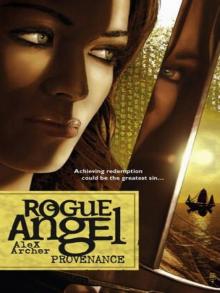 Provenance
Provenance Blood Cursed
Blood Cursed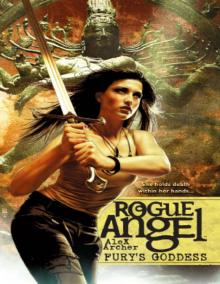 Fury's Goddess
Fury's Goddess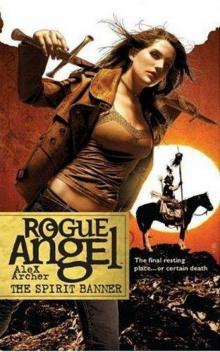 The Spirit Banner
The Spirit Banner Footprints
Footprints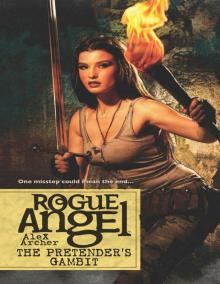 The Pretender's Gambit
The Pretender's Gambit Rogue Angel: The Lost Scrolls
Rogue Angel: The Lost Scrolls Staff of Judea
Staff of Judea Rogue Angel 55: Beneath Still Waters
Rogue Angel 55: Beneath Still Waters The Mortality Principle
The Mortality Principle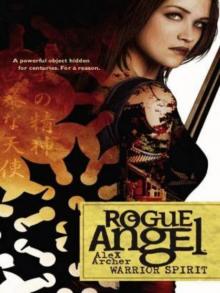 Warrior Spirit
Warrior Spirit Paradox
Paradox Tear of the Gods
Tear of the Gods Forbidden City
Forbidden City River of Nightmares (Rogue Angel)
River of Nightmares (Rogue Angel) Rogue Angel: The Secret of the Slaves
Rogue Angel: The Secret of the Slaves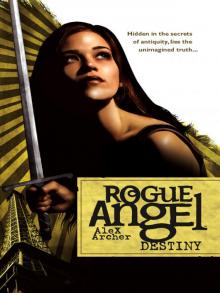 Destiny
Destiny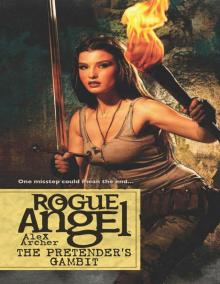 Rogue Angel 51: The Pretender's Gambit
Rogue Angel 51: The Pretender's Gambit Celtic Fire
Celtic Fire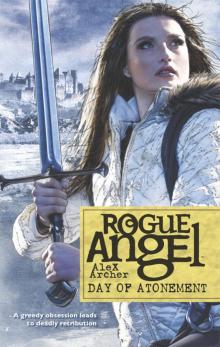 Rogue Angel 54: Day of Atonement
Rogue Angel 54: Day of Atonement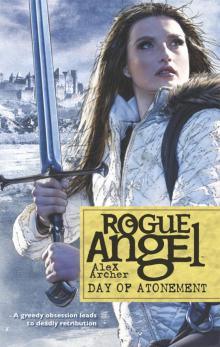 Day of Atonement
Day of Atonement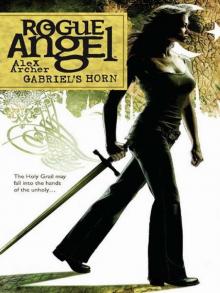 Rogue Angel: Gabriel's Horn
Rogue Angel: Gabriel's Horn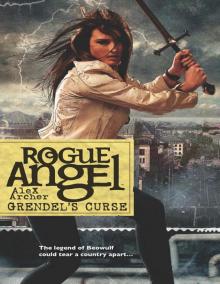 Grendel's Curse
Grendel's Curse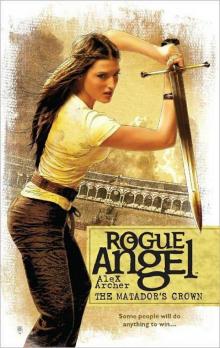 The Matador's Crown
The Matador's Crown Rogue Angel: The Chosen
Rogue Angel: The Chosen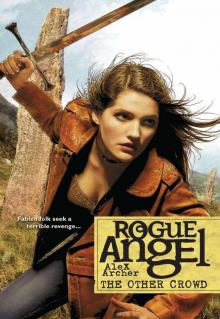 The Other Crowd
The Other Crowd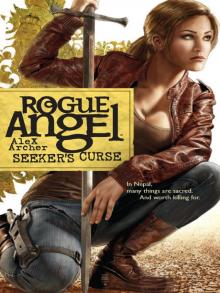 Seeker’s Curse
Seeker’s Curse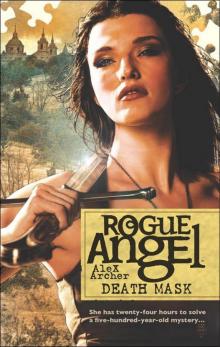 Rogue Angel 52: Death Mask
Rogue Angel 52: Death Mask The Golden Elephant
The Golden Elephant Blood Cursed (Rogue Angel)
Blood Cursed (Rogue Angel) Celtic Fire (Rogue Angel)
Celtic Fire (Rogue Angel)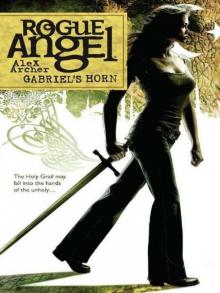 Gabriel's Horn
Gabriel's Horn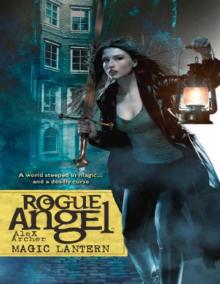 Magic Lantern (Rogue Angel)
Magic Lantern (Rogue Angel) God of Thunder
God of Thunder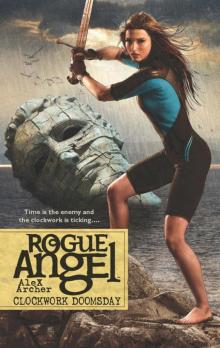 Clockwork Doomsday
Clockwork Doomsday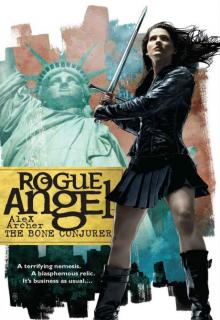 The Bone Conjurer
The Bone Conjurer Treasure of Lima
Treasure of Lima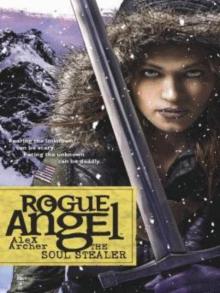 The Soul Stealer
The Soul Stealer The Dragon’s Mark
The Dragon’s Mark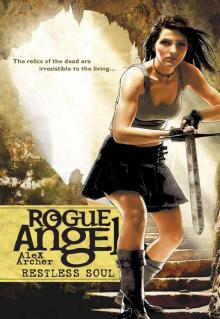 Restless Soul
Restless Soul Rogue Angel: God Of Thunder
Rogue Angel: God Of Thunder Rogue Angel 49: The Devil's Chord
Rogue Angel 49: The Devil's Chord Death Mask
Death Mask Rogue Angel 46: Treasure of Lima
Rogue Angel 46: Treasure of Lima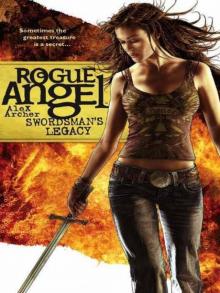 Swordsman's Legacy
Swordsman's Legacy The Oracle's Message
The Oracle's Message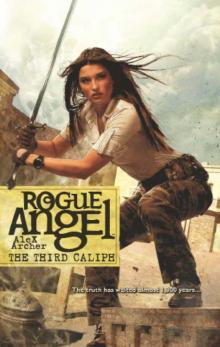 The Third Caliph
The Third Caliph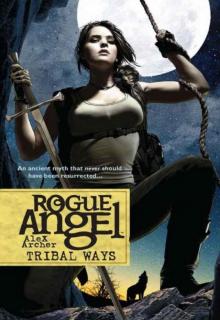 Tribal Ways
Tribal Ways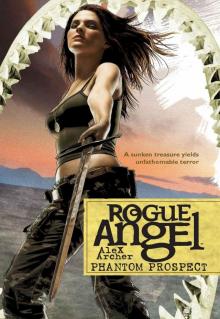 Phantom Prospect
Phantom Prospect Rogue Angel 50: Celtic Fire
Rogue Angel 50: Celtic Fire Library of Gold
Library of Gold Rogue Angel 53: Bathed in Blood
Rogue Angel 53: Bathed in Blood Sacred Ground
Sacred Ground The Devil's Chord
The Devil's Chord Serpent's Kiss
Serpent's Kiss The Vanishing Tribe
The Vanishing Tribe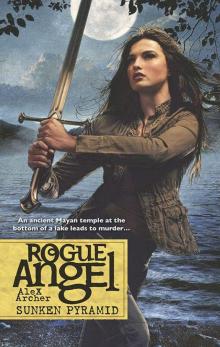 Sunken Pyramid
Sunken Pyramid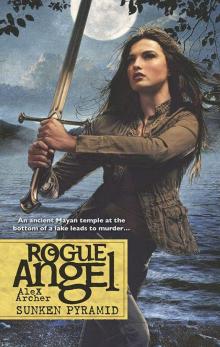 Sunken Pyramid (Rogue Angel)
Sunken Pyramid (Rogue Angel)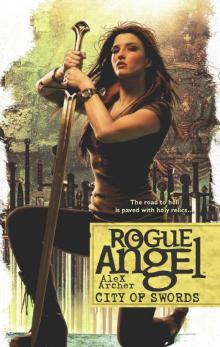 City of Swords
City of Swords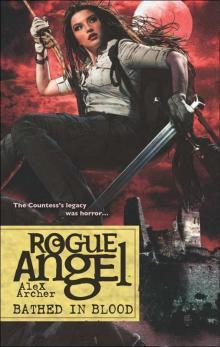 Bathed in Blood
Bathed in Blood The Lost Scrolls
The Lost Scrolls The Babel Codex
The Babel Codex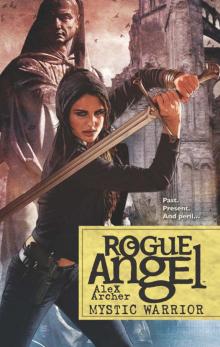 Mystic Warrior
Mystic Warrior Eternal Journey
Eternal Journey Beneath Still Waters
Beneath Still Waters Solomon's Jar
Solomon's Jar Beneath Still Waters (Rogue Angel Book 55)
Beneath Still Waters (Rogue Angel Book 55) Cradle of Solitude
Cradle of Solitude Secret of the Slaves
Secret of the Slaves River of Nightmares
River of Nightmares Polar Quest
Polar Quest False Horizon
False Horizon